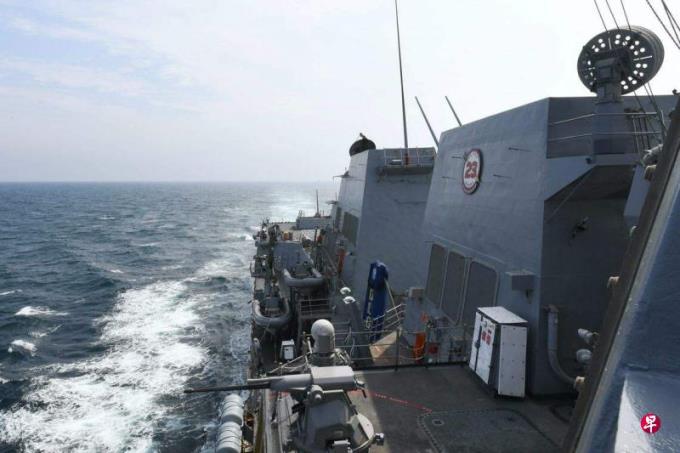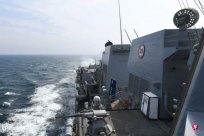
U.S. President Bynden said recently that the United States does not seek Taiwan independence. If mainland China tries to change the status quo, Washington does not rule out the use of force to protect Taiwan.This is the fifth time since Biden took office in 2021, it did not rule out the protection of martial arts to protect Taiwan.Although some Taiwanese scholars analyzed that Biden did not promise to protect Taiwan in the interview, and depending on the situation of the Taiwan Strait at the time, it still maintained a strategic fuzzy strategy.But this is indeed the first time that the US President has made such a clear position since the United States and Taiwan have broken diplomatic relations in 1979.Considering the current Sino -US relations, it can be believed that Taiwan, as a key part, has been embedded in the US "return to Asia" strategy.
Although the United States is a global country, the overall strength of the country and the global layout are unmatched by other countries, but after all, resources and energy are limited, and the national strategy of the United States can often only be concentrated in certain regions.As in the moment, although the United States has been emphasizing the importance of the Indo -Pacific region, the relevant bill passed, such as the foreign aid bill passed in April, the resources are mainly focused on the conflict Ukraine and Israel.
Carefully review that the earliest "return to Asia" strategic transfer in the United States was in the early days of the former President Bush.In view of the rapid rise of China and the importance of Asia, Bush tried to promote the implementation of this strategic center of gravity in the early days of taking office.This is closely related to the United States' consolidation of global influence and status.But since then, the incident of the September 1st incident has changed the strategic focus of Bush, and the United States focuses on the war in the Middle East and the Anti -terrorism war.
In November 2011, the Obama administration officially proposed the "Asia -Pacific rebalancing" strategy to enhance the influence of the United States in Asia by strengthening economic, political and military connections with Asian countries.However, although this strategy is theoretically forward -looking, many challenges are faced in actual implementation.The first is the problem of resource allocation. Due to the continuous turbulence of the Middle East, the United States has to continue to invest a lot of resources to maintain the stability of the region.The second is the constraints of domestic politics. Whether it is the restrictions on the budget or the opposition of Congress, it makes it difficult for the "Asia -Pacific rebalancing" strategy to implement it.
After Trump took office in 2016, the strategic focus of the United States had a more obvious trend of moving towards Asia.The "U.S. Priority" policy pursued by the Trump administration has strengthened the United States' attention to Asia to a certain extent, especially through trade war and curbing policies to China, trying to put pressure on China in economy and military.
However, with the outbreak of the Russian and Ukraine War, the United States 'eyes have been shifted to Europe again, which further shows that the United States' global strategic layout is uncertain.
Despite many challenges, the United States still stubbornly insists on turning towards "Asia -China".Biden did not cancel Trump's trade war, but continued to strengthen the tariff war in the year of this election.At the same time, it has changed its high -tech curb strategy, that is, the "small courtyard high wall" has also changed to the "high wall".This means that the previous strategy of the United States lacks practical results on China, or has not met expectations.
In addition to the fields of trade, military, technology, and finance, Taiwan is undoubtedly an important fulcrum for the United States to consolidate its Asian advantage and curb in mainland China.As a result, Bayeng has explicitly expressed his statement that he will defend Taiwan many times.Although U.S. government officials will immediately emphasize that Biden has not announced any policy changes and US policies have not changed.
For Beijing, the current advantage is that although the US strategy has been turning, there are various constraints from beginning to end.There are existing external factors, such as the Russian and Ukraine War, as well as factors for domestic politics.For major transformations such as the focus of US strategy from Europe to Asia, it is often necessary to have a significant impact on the United States in order to change rapidly.For example, Japan's attack on Pearl Harbor during World War II, or 2001 terrorist attacks in 2001.Historical experience shows that unless similar events occur, it is difficult for the United States to form a wide range of consensus quickly and support the strategic focus completely to Asia.
Therefore, in order to prevent the United States from completely reversing the situation, the focus is completely shifted to "Asia -China", especially when this steering will seriously hinder the unification of both sides of the strait.The situation of the Taiwan Strait is one of the important focus.If the situation in the Taiwan Strait worsen further, it may cause the United States to increase its military existence in the region, thereby strengthening its Asian strategy.
Another potential hotspot is the South China Sea.Since the beginning of this year, the attention of issues in the South China Sea has been heating rapidly, and it has even replaced the Taiwan issue and has become the hottest event in the region.If the tension of the South China Sea is upgraded, and then considering that there is a military contract between the United States and the Philippines, a major conflict may become another excuse for the United States to strengthen its Asian strategy.
From a practical point of view, Beijing needs to evaluate the impact of different issues in the region on the transition of the US strategic focus. At the same time, it takes into account the priority of these issues. Especially considering that when the US strategic focus is completely turned to Asia, these are these.The difficulty of solving the problem.
(The author is a Beijing media)




